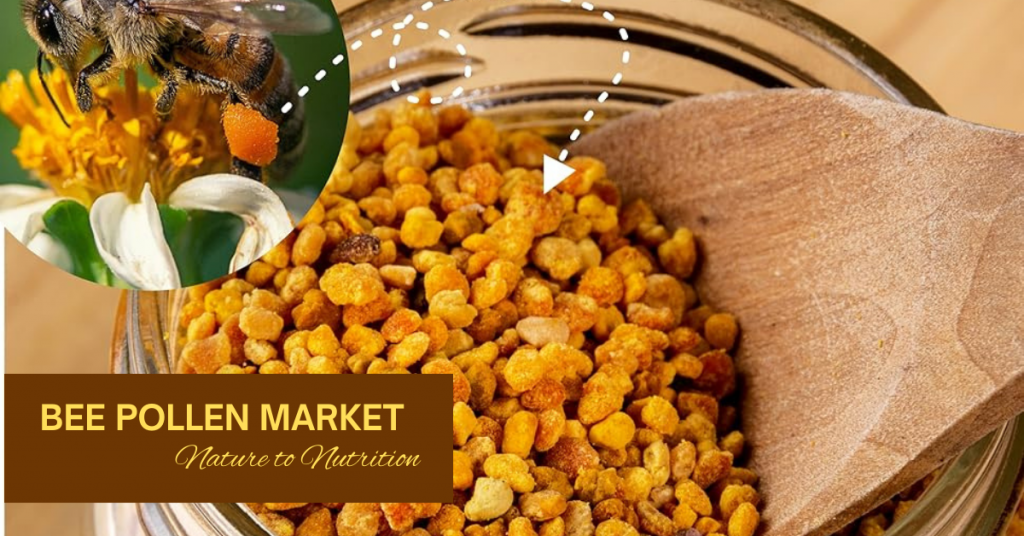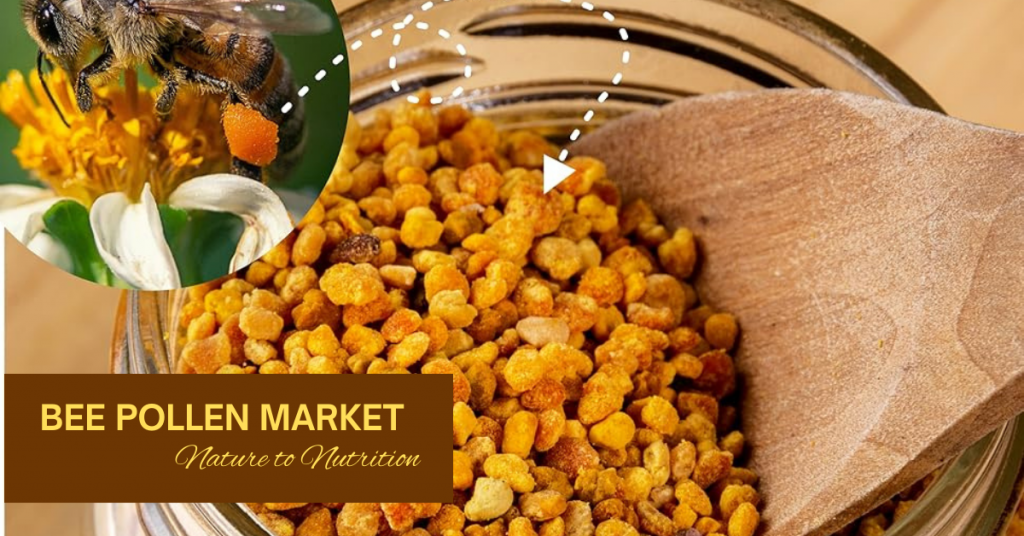
Market Overview
The Bee Pollen Market is projected to grow from USD 964.77 million in 2024 to USD 1,351.1 million by 2032, at a compound annual growth rate (CAGR) of 4.3%. This steady growth highlights the rising global awareness of bee pollen as a potent nutritional supplement and its expanding application across food and pharmaceutical sectors. Increasing health consciousness among consumers and growing interest in natural and organic supplements are supporting this surge. The expanding wellness industry and the demand for functional foods are further propelling this market forward.
Bee pollen is a nutrient-rich compound collected by bees from flower stamens and is renowned for its proteins, vitamins, minerals, and antioxidants. It is often marketed as a natural energy enhancer and immune booster. The shift toward holistic well-being and preventive healthcare has brought such natural superfoods into the spotlight. This shift is particularly evident in developed markets, where consumers are actively replacing synthetic supplements with naturally sourced alternatives like bee pollen.
In the current global landscape, sustainability and clean-label products are more important than ever. Bee pollen fits perfectly into this evolving narrative due to its natural sourcing, traceability, and multifunctional benefits. The bee pollen market also aligns with the rising interest in bee conservation and biodiversity, indirectly creating a positive brand narrative for companies involved. Overall, the bee pollen market is not just thriving due to its nutritional profile but also because of changing consumer mindsets and growing acceptance of eco-conscious, functional foods.
Buy full Report: https://www.credenceresearch.com/report/bee-pollen-market
Market Drivers
Rising Demand for Natural Supplements
Health-conscious consumers are increasingly shifting toward natural, organic supplements over synthetic alternatives. Bee pollen, rich in nutrients like amino acids, enzymes, and vitamins, is considered a superfood. Its natural appeal makes it highly popular among individuals focused on clean eating and plant-based lifestyles. As dietary supplement markets expand, bee pollen finds a stable position due to its multifunctional benefits.
Growth in Functional Food and Beverage Industry
The growing trend of incorporating natural ingredients into everyday food and beverages has significantly supported the bee pollen market. From smoothies to protein bars, bee pollen is being introduced as a nutrient enhancer. Manufacturers are responding to consumer demand for products that offer both taste and health benefits, and bee pollen stands out for its versatility and wellness attributes.
Expansion of E-commerce and Direct-to-Consumer Channels
Online retailing has emerged as a vital channel for superfoods, including bee pollen. E-commerce platforms allow consumers to access a wide range of international and domestic bee pollen brands. Digital platforms also enable better product visibility, consumer education, and easier access, thus supporting market penetration, especially in emerging regions.
Rising Awareness About Bee Products and Sustainability
Increasing campaigns on bee conservation and sustainable agriculture have created awareness about bee-derived products like pollen. Ethical sourcing and eco-conscious branding contribute to the positive perception of bee pollen. Moreover, the promotion of sustainable beekeeping practices strengthens the reputation of bee pollen as a responsibly sourced wellness product.
Market Challenges
Limited Regulatory Standardization
One of the main challenges is the lack of global standardization in defining the quality, purity, and classification of bee pollen. Regulatory discrepancies make international trade and marketing more complex. Companies often face difficulties in labeling and compliance, especially in pharmaceutical or therapeutic applications.
Risk of Contamination and Adulteration
Bee pollen can be prone to contamination from pesticides, heavy metals, or pathogens due to environmental factors. This raises concerns among health-conscious consumers and regulatory bodies. Ensuring purity and authenticity is a consistent challenge, especially in large-scale production and export operations.
High Sensitivity to Environmental Conditions
Bee pollen production is highly dependent on seasonal and regional factors, making its availability inconsistent. Factors like climate change, pollution, and habitat loss directly impact bee populations and pollen yields, affecting the overall supply chain of bee-related products.
Competitive Pressure from Alternative Superfoods
The market is crowded with a variety of superfoods, such as spirulina, chia seeds, and moringa, which offer overlapping health benefits. As a result, bee pollen faces competition for shelf space and consumer attention, requiring constant innovation in branding and positioning to retain relevance.
Market Opportunity
Innovation in Product Formulations
There is a growing opportunity for innovation in how bee pollen is integrated into consumable products. Companies can explore formats like capsules, tablets, infused drinks, or nutritional powders. Enhanced formulations and delivery methods can attract a broader consumer base seeking convenience and variety.
Rising Demand from Vegan and Plant-Based Consumers
Although not strictly vegan, bee pollen is increasingly accepted by flexitarians and plant-based consumers seeking natural wellness options. By aligning marketing with ethical sourcing and bee welfare, companies can tap into the plant-based lifestyle market, which is growing rapidly across the globe.
Expansion in Emerging Economies
Emerging markets in Asia Pacific and Latin America offer untapped growth potential for bee pollen products. Rising disposable incomes, increasing health awareness, and digital connectivity make these regions promising frontiers for global and local manufacturers to expand distribution networks and build brand presence.
Collaborations with Fitness and Wellness Brands
Partnering with wellness influencers, fitness coaches, and holistic health platforms presents a key growth channel. Co-branded supplements, functional beverages, and snack lines can help companies create differentiation and foster deeper engagement with health-focused consumers.
Market Segmentation
Based on Type:
- Wild Flower Bee Pollen
- Rape Bee Pollen
- Others
Based on Application:
- Food
- Pharmaceutical
- Others
Based on Region:
North America
- U.S.
- Canada
- Mexico
Europe
- Germany
- France
- U.K.
- Italy
- Spain
- Rest of Europe
Asia-Pacific
- China
- Japan
- India
- South Korea
- Southeast Asia
- Rest of Asia-Pacific
Latin America
- Brazil
- Argentina
- Rest of Latin America
Middle East & Africa
- GCC Countries
- South Africa
- Rest of the Middle East and Africa
Regional Analysis
North America
North America leads the global bee pollen market, supported by strong consumer demand for organic and functional foods. The U.S. in particular has a robust wellness industry and a growing base of informed consumers. E-commerce penetration and advanced beekeeping techniques contribute to steady growth.
Europe
Europe shows significant potential due to rising interest in sustainable and natural supplements. Countries like Germany, France, and the UK are key markets. Strict regulatory compliance ensures high-quality products, boosting consumer confidence and repeat purchases across food and pharmaceutical applications.
Asia Pacific
Asia Pacific is a fast-growing region in the bee pollen market, driven by rising health consciousness and traditional uses of bee products. China, Japan, and India are major contributors. Expanding urbanization and dietary shifts toward natural wellness solutions are propelling demand.
Latin America
Latin American countries such as Brazil and Argentina are increasingly adopting bee pollen in both food and natural medicine sectors. Strong biodiversity and favorable climate conditions make the region a promising area for bee pollen sourcing and export, aiding market expansion.
Middle East & Africa
The Middle East and Africa show emerging potential with rising awareness around holistic wellness and natural products. The market is in its early stages but presents long-term growth opportunities through regional health campaigns and increasing retail access to international brands.
Top Companies
- NOW Foods
- BeeVital
- Swanson Health Products
- YS Bee Farms
- Livemoor
- Honey Pacica
- Beekeeper’s Naturals
- Apicoltura Burato
- Crockett Honey Co.
- Sattvic Foods
Future Outlook
- Growing preference for organic and traceable health supplements.
- Demand for clean-label food additives will support product integration.
- Increased investment in sustainable beekeeping practices.
- Asia Pacific will continue to emerge as a major consumer base.
- Product innovations will shift toward fortified, easy-to-consume formats.
- Pharma companies may explore bee pollen in immune therapy products.
- Collaborations with health tech startups will expand market reach.
- Blockchain-based tracking could enhance transparency and consumer trust.
- E-commerce growth will fuel niche product demand and global reach.
- Educational campaigns will strengthen consumer awareness and boost usage.
Buy full Report: https://www.credenceresearch.com/report/bee-pollen-market

